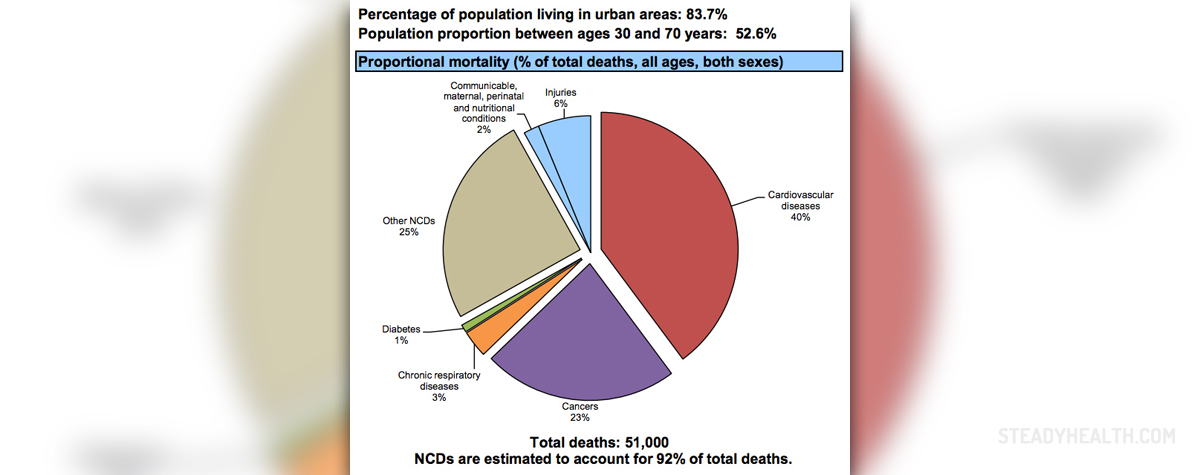
Definition of Non-communicable Disease
NCD is short for non-communicable disease which is a term used for any type of disease or other medical condition which is not infectious. These medical conditions are in most cases characterized by a rather long duration and an extremely slow progression. NCDs are also often mistakenly referred to as chronic diseases but that is simply not the best way of characterizing these specific types of medical conditions, mainly due to the fact that they are never caused by any type of infectious cause. There are a large number of chronic diseases triggered by infectious causes, so these two types of medical conditions should not be mixed, although they both require chronic care management.
Relevant Statistical Data
The World Health Organization claims that the global burden of disease slowly and gradually shifts from infectious diseases to non-communicable diseases. At the same time, life expectancy in Western Civilization has increased over the course of the past few decades while the health care costs are increased with each year, mainly due to the fact that there are a growing number of people who suffer from NCDs everywhere around the world. Another shocking fact is that non-communicable diseases are the leading cause of death in the world. They represent more than 60 percent of deaths and they affect both men and women equally. Over the years, NCDs were always associated with economic development, but they gradually started affecting people associated with low and middle income as well. This is why NCDs need to be prevented and controlled on a global level. A global partnership called the NCD Alliance has been founded in 2009 and its main goals include human rights for people with NCDs, global access to affordable and good quality medicines and technologies, strengthened health systems, improved lifestyles, a tobacco free world and NCD national plans for all. NCDs are also associated with absenteeism and presenteeism. For those who do not know, absenteeism is the term used for absence from work caused by illnesses, while presenteeism is a term used for the loss of productivity at work and also low levels of performance triggered by health related problems.
Causes of NCDs
There are numerous risk factors which can be associated with non-communicable diseases and the most common ones include obesity, hypertension, physical inactivity, unhealthy diet, smoking, exposure to air pollution, genetics, sex, age and other behaviors, lifestyle and environment related factors. All these factors can be modified so that is why NCDs can easily be prevented. The five important risk factors for NCDs identified by the World Health Organization include overweight, alcohol consumption, tobacco use, raised cholesterol and raised blood pressure.
Environmental Diseases and Inherited Diseases
Environmental diseases are medical conditions which are commonly triggered by different sorts of external factors such as lifestyle choices, pollution, food and sunlight. The most common types of environmental non-communicable diseases include skin cancer triggered by the radiation from the sun, malnutrition triggered by the consumption of too little food or wrong types of food, lower back pain triggered by a lack of physical activity, diabetes mellitus type 2, chronic obstructive pulmonary disease triggered by the consumption of tobacco and many different types of cardiovascular diseases. Inherited diseases are completely different from environmental diseases because they are commonly triggered by the errors in genetic information of people. Such errors may include rearrangements of genetic information, defects in single genes caused by mutation or changes in the chromosome numbers. One of the most common types of inherited non-communicable diseases is the one known as cystic fibrosis.
List of Non-communicable Diseases
The list of non-communicable diseases is rather long but the most common ones include cataracts, Alzheimer’s disease, osteoporosis, chronic kidney disease, diabetes, asthma, different types of cancer, stroke, heart disease, gout, hyperthyroidism, hypothyroidism and psoriasis. Chronic kidney disease is treatable but the big problem with it is that it may lead to the development of certain other non-communicable diseases such as hypertension and diabetes. It is closely related with other NCDs and it often coexists with them. Diabetes mellitus, as another common non-communicable disease can be prevented and managed rather easily, but on the other hand it is very difficult to cure completely. Blood sugar levels of a patient need to be kept as close to normal as possible and the methods for doing so usually include insulin medications, a steady exercise regime and very precise dietary management. Lack of regular exercise, high blood pressure, obesity, high levels of cholesterol in the blood and smoking may all accelerate the harmful effects of diabetes so they need to be avoided as much as possible. Cancer is a dreadful medical condition but in most cases it can easily be prevented simply by avoiding certain risk factors which are commonly associated with its development and those include air pollution, sexually transmitted infections, alcohol, physical inactivity, low vegetable and fruit intake, obesity and tobacco. The same can be said for cardiovascular disease.

















Your thoughts on this
Loading...